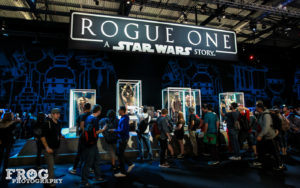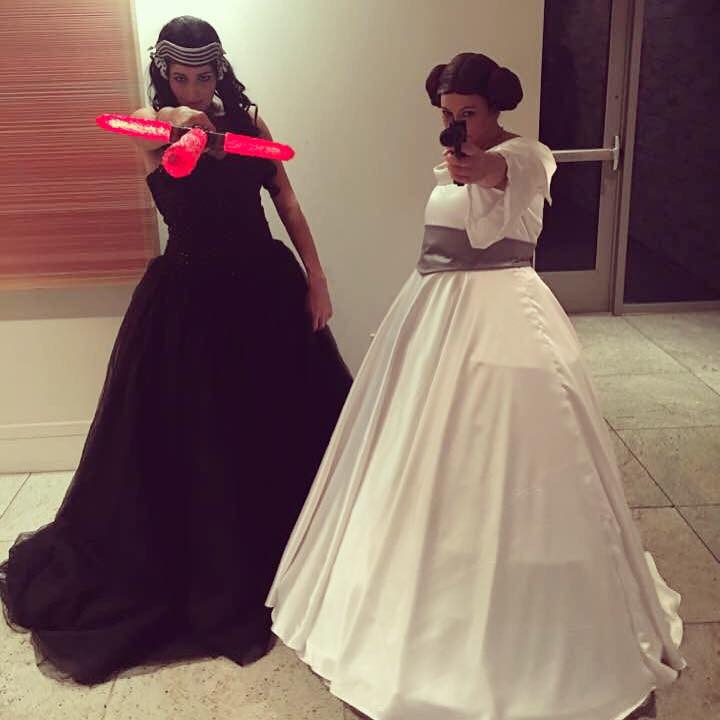Re: The Co-Opting of Geek Culture – It Wasn’t Stolen, It Evolved
It seems like every so often an article comes out trying to define what ‘geek culture’ actually is, while dismissing large swaths of fans. This time the fandom gatekeeping article comes from FlickeringMyth.com with a piece titled ‘You’re Not a Nerd: The Co-Opting of Geek Culture.’
The article narrowly defines certain geeky characteristics that the author views as defining geek culture, while dismissing anything that’s remotely popular. The general thesis of the piece seems to make the assumption that once something becomes popular it is automatically disqualified from having a geeky fandom.
The author also defines exactly how people should consume said media to be considered geeky. If you don’t consume media in the way he approves of, then you don’t count. He doesn’t take into account the fact that the term has evolved to encompass many different types of fandoms and forms of media consumption beyond his more narrow scope on the subject.
We’re a huge group of people and attempts to gatekeep who can and cannot claim the term as their own cuts out a lot of amazing people.
Let’s break down the author’s arguments one by one:
1. Liking Star Wars doesn’t make you a geek or a nerd.

If the argument here is that casual viewers might not fit into the ‘geek culture’ umbrella, I might have agreed with this partially. I’d still defend a person’s choice to define themselves with the term if they feel it applies, though, but it’d have been an interesting discussion. To me, being a geek is about how you fan, not necessarily what you fan. Casual viewers don’t often get invested enough to claim the ‘geek’ title as their own. Those that delve into fandom works, cosplay, convention culture, intense online debates, real life events (the May the Fourth Be With You event I attended was awesome), merchandising, reading meta materials and interviews, and so on tend to claim the term passionately. I really don’t see people who don’t engage in fandom in some way really clamoring for the title.
That, unfortunately, is not the argument being presented here. This is a piece of his argument (full article here). The emphasis is mine.
You know what made you a nerd back then: liking Tron, Krull, Dune, or Dragonslayer. Asking your parents to take you to see Star Trek: The Motion Picture and still thinking it was awesome in spite of how painfully boring it was.
Star Wars fandom doesn’t make you a geek. It’s the most popular example of a genre beloved by generations of film fans. Liking Star Wars is not something that makes you different.
He’s dismissing the entire Star Wars fandom simply because it’s popular. The argument boils down to the fact that Star Wars is liked by people who don’t fall under the geek label, therefore the fandom is not allowed to be considered geeky at all. This is the very definition of gatekeeping. He is deciding who can and cannot claim this title based on the obscurity of the franchise. The last time I checked, the clique that based their terms of entry on the obscurity of the media they enjoy were the hipsters, not the geeks.
Star Wars isn’t my biggest fandom right now. I’m far down the Yuri on Ice rabbit hole at the moment (which probably surprises nobody who knows me), but not as many people in my daily life know about this queer little ice skating anime. Almost everyone knows about Star Wars, which has the opposite effect on me as it did this author. I am thrilled that people can relate to something I’m passionate about even on a more casual level. I appreciate that my manager and the CEO of my company both stop by my desk and ask me “how many days until the next Star Wars?” I have an app on my phone counting down to each film and they are amused at how quickly I can answer. They brought out my birthday cake last year while playing the Imperial March. This has become my thing right now at work, even though there are more obscure things I’m much more interested in right now. But I enjoy these moments immensely and it’s never crossed my mind that these moments are somehow co-opting my geekiness.
2. Liking video games does not make you a geek or a nerd
This form of gatekeeping about geek culture is about how you consume the media and it’s just as wrong as defining a fandom activity by its popularity. According to this author, you must interact with video games the same way this author does, and not the more common ways, in order for your gaming to count. You see this form of gatekeeping used not just in gaming, but in the anime and manga fandoms, superhero fandoms, book fandoms, etc. But the argument is ridiculous everywhere it’s used.
Here’s an excerpt of what type of gaming is acceptably ‘geek’ to him:
If you spent your lunch break trying to code a game on your school’s Apple IIc, you can proudly call yourself a nerd. If you skipped school dances because you wanted to beat Ultima, you could call yourself a nerd. Just playing video games makes you the majority of human beings on planet Earth.
If you love video games and identify as a nerd, you’re a nerd. Congratulations. You are part of geek culture if you want to be. We don’t need to fill out a checklist of things to meet criteria. You don’t get to gatekeep them out of this community because they enjoy things differently than you. Just as the popularity of something doesn’t eliminate it from being geeky, neither does using a more common way of consuming media. It just doesn’t work that way.
3. Liking superhero movies does not make you a geek or a nerd
 I’m going to let his words speak for themselves here because he manages to fit both of the above arguments into one as though it were something entirely new.
I’m going to let his words speak for themselves here because he manages to fit both of the above arguments into one as though it were something entirely new.
If your only exposure to the world of superheroes is the bi-annual Marvel movie or Netflix offering, you’re not a geek. If you actually read the comic books these stories are based on, you might be. […] If you only read Marvel and DC Comics, you’re not a geek.
Like Obscure Things: More than Marvel or DC – Check.
Enjoy Things The Way He Does: Comic Books, not movies – Check
These are the same arguments used against Star Wars and gaming, so it’s not worth rehashing my arguments against those two points. It all applies here as well.
Instead of his bullet points defining different arguments about how geek culture has been co-opted, he seemed to use each section to rail against a specific fandom. He seems particularly pissed off at Star Wars, gaming, and MCU and DCU fandoms.
I don’t understand why having common ground with a larger segment of the population is such a bad thing? It doesn’t affect my enjoyment of it in the slightest. It shouldn’t bother you either.
But of all the parts in this article that upset me, it was this one that upset me the most:
[‘Geek’ or ‘nerd’ is] a convenient adjective used far too often by people who don’t appear to be geeks or nerds.
Let’s break this down carefully here.
First, let’s talk about describing these titles as ‘convenient.’ It’s not. Despite the fact that some of our geeky hobbies have grown popular, I am definitely not seen as ‘cool.’ I, too, was bullied in school. I still suffer to this day when cliques form among the ‘cool’ people and I’m conveniently excluded. I’ve always been an outcast and my favorite things becoming popular hasn’t changed that. But I’m not offended that some of those cool kids happen to know about and enjoy this thing I geek out about.
As I stated before, it’s kind of neat to have people outside my normal cirlces understand me on some level. It doesn’t feel like they are co-opting my community, but rather using this common ground to interact with me.
It feels pretty awesome to me. But it’s not at all a ‘convenient’ label. Being ‘the geek’ of the office or family still comes with awkward moments and exclusion. I wouldn’t have chosen to claim this label for convenience. I chose it because it’s a community I feel that I’m part of, with relatable people who have similar interests that I do. The geek community is a comfortable place for me and I don’t feel like it’s being threatened by the ‘cool kids’ at all.
But the second part of this quote, ‘people who don’t appear to be geeks or nerds,’ is the part that angers me the most. This often strikes me as coded language particularly (though not exclusively) aimed at women in geek culture. It’s often particularly aimed at women cosplayers. That isn’t outlined specifically in this article, and he in fact posts the picture of a ‘good looking’ man to accompany this part of his article, but I’ve seen this same type of rhetoric used towards my beautiful cosplay friends over and over and over again. Despite the context of this phrasing being defined differently in this article than I’ve seen elsewhere, I’ve seen it before and rebuttal is the same.
By refusing people from our community based on appearance, we are no different than the bullies who harassed us and continue to exclude us to this day. But I believe that we are better than them, because we aren’t going to gatekeep and judge people on their appearances. When we start doing that, we become the bullies that tormented us.
Don’t become the thing you hate like this. Be better. Be less judgmental. Accept these geeks with open arms regardless of where their entry point in this fandom is. Stop judging them for their looks or the popularity of their fandom or how they choose to consume their media. That makes you the bully.
Author: Angel Wilson
Angel is the admin of The Geekiary and a geek culture commentator. They earned a BA in Film & Digital Media from UC Santa Cruz. They have contributed to various podcasts and webcasts including An Englishman in San Diego, Free to Be Radio, and Genre TV for All. They identify as queer.
Help support independent journalism. Subscribe to our Patreon.
Copyright © The Geekiary
Do not copy our content in whole to other websites. If you are reading this anywhere besides TheGeekiary.com, it has been stolen.Read our








*erupts into flames*
Ok, Ok, I’m cool.
Honestly, this person’s views of geekdom and nerdery should be left in the 80’s with that terrible Nerd movie franchise.
I have seen women who spend every waking moment in their fandoms, creating costumes, art, stories, etc. surrounding whatever they are choosing to geek out over.
Yes, the original term came off as negative, but as I’ve seen over the past couple decades, people have become proud of their labels, and have reclaimed them as something positive, such as the sub-definition of Geek as “a knowledgeable and obsessive enthusiast.”
I love how they’re trying to police the term’s ~purity of use~, even as they’re using it COMPLETELY differently from the original meaning, too.
“Geek” originally meant “a carnival performer who performs wild or disgusting acts” (like biting the head off a live chicken). Actually, scratch that – go far back enough and it just means “fool” in German!
You don’t see them vociferously insisting on strictly retaining THAT definition’s ~purity~ – the word’s already drastically changed meaning over the centuries, as most words do – so you know what? They can whine as much as they want but LINGUISTICS says they’re idiots trying to self-righteously, knee-jerk control things that are completely uncontrollable. So the joke’s on them.
Also… regarding this particular guy’s argument (I say “guy” because it appears to be a male writer in the byline): “Star Wars fandom doesn’t make you a geek”? Talk about a Fake Geek Boy! Isn’t Star Wars FAMOUS for its massive expanded universe!? You know, the massive set of novels, games etc where every single one-scene character from the movies gets/got an entire backstory and motivation and sometimes a whole fictional culture expanded upon, even if the original scene in the original movie didn’t even name them!? (E.g. the unnamed Twi’lek dancer who gets killed by Jabba the Hut – the novels of the Expanded Universe actually gave her a whole story arc, where it’s revealed that the real reason Jabba killed her is he discovered she was trying to lead a revolt among his other slaves. None of which is in the movie, where she never even gets a proper name, but Star Wars, ahem, GEEKS, know stuff like this!). Aren’t there even conlangs for Star Wars, for that matter? THOUSANDS of years of fictional history – of conflicts, of the rise and fall of entire empires and competing philosophies – in the Galaxy Far Far Away?? Jeebus, if that’s not a “geek”-friendly fandom by modern definition, then I don’t know what IS! A hardcore Star Wars fan is NOT a ~filthy casual~, trust me – they’re as nerdy as it gets.
This guy frankly sounds like he was completely ignorant of how “Star Wars fandom” actually operates. Hell, it sounds like he doesn’t even know what “fandom” means or originates from either – it’s a portmanteau of “fan(atic)” and “kingdom”, people. Fandom by definition requires obsession! And obsession IS the only trait that is consistently considered “geek” in current, modern, WIDESPREAD English usage. Which no matter how much people like him kick and flail, is not going to change the way it’s evolved.
tldr: the Lad Doth Protest Too Much, Methinks. The more you look at his argument, the dumber and more shallow it seems. Ironically, “dumb and shallow understanding of the subject” is something usually snarked about with the “Fake Geek Girl meme”. I get the feeling he’s exactly the type to laugh at that meme…
*slow clap* This this this.
I cut my teeth on Old Republic comics from DarkHorse that were definitely “geeky.”
And, surprise surprise, “”normal”” people went out to see Star Wars when the original trilogy came out, not just “geeks.” Back then, the “geeks” were hiding out in basements, playing Talisman and wishing for a better barbarian.
This sort of gatekeeping ignores the fact that culture is an ever-evolving organism, shaped and defined by interaction, exposure, and new iterations.
Same I’m proud proud to be call a geek when I geek over whatever I to geek over that is just our way of expression myself, and people will just have to deal with it because this is how geek nowadays are! Granted I only geek out on my favorite thinks like books and movies an ect. But when I do it I do it to the max!